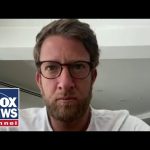In the ever-evolving theater of American politics, there are few characters as polarizing as Donald Trump. His recent interview has reignited a discussion familiar to those who closely follow political drama: the delicate relationship between presidential authority and the Constitution. Critics have seized on his comment of “I don’t know,” treating it as a shocking admission. However, a deeper dive into the context reveals a different narrative, one that questions the fairness of political commentary and the responsibility of media frameworks like The View.
At the heart of the controversy is a particular exchange where Trump appears to express uncertainty about the specifics of the Fifth Amendment and the due process owed to non-citizen detainees. Opponents quickly portrayed this as a lack of understanding or an outright disregard for the Constitution. Yet what seems overly dramatic is the rush to judgment before considering the broader picture. Trump’s reluctance to definitively state constitutional interpretations underscores a truth in the complexity of immigration law and due process, areas more fitting for legal experts than a generalized soundbite.
The media’s appetite for controversy often drowns out the subtleties that provide clarity. Trump mentions relying on his team of “brilliant lawyers” to navigate these legal waters, pointing to a significant detail often overlooked by his critics. The judiciary’s role in interpreting the Constitution is fundamental, and while it’s the president’s duty to uphold it, the process invariably involves consultation with legal minds experienced in such intricate matters. It is the dedicated role of skilled attorneys to interpret and argue these nuances within the bounds of what the Supreme Court affirms.
What slips through the cracks in these heated debates is Trump’s underlying focus: the urgency of addressing illegal immigration’s ramifications. Despite the media’s selective attention, he reiterates his mandate to protect American citizens from what he characterizes as detrimental elements infiltrating the nation. Courts have sometimes positioned themselves as obstacles in this duty, leading to frustrations that are interpretable as an exasperation rather than constitutional ignorance.
Critics like those on The View indulge in what they believe is vigilance, yet their fervor often lacks the fairness and depth that complex issues demand. The reactions underscore a broader societal challenge—the translation of political discourse through media megaphones can create a distorted reflection of the original content. There is a crucial difference between constructive critique and a ready-made narrative that fits preconceived biases. In this case, by thoroughly examining the statements and intentions behind Trump’s words, one can discern the multifaceted reality of governance where executive intentions must collaborate with constitutional provisions.




